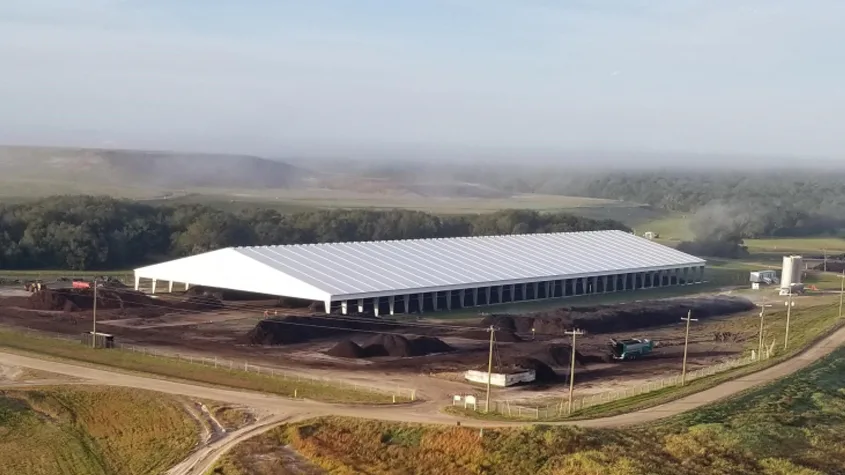
“One person’s trash is another person’s black gold,” or so goes new Hillsborough County saying
Maximizing waste reduction to lower costs for residents and protect human and environmental health is an important Hillsborough County goal. The County’s Biosolids Composting Facility accomplishes this by creating “black gold,” also known as compost. The compost is made from two waste products: mulched yard waste and biosolids, which are treated wastewater residue. The County also offers workshops and provides materials for residents to make their own compost at home from kitchen and yard waste.
Transforming waste into black gold
The County’s Biosolids Composting Facility, which produces and sells the compost, is a partnership between two County operations – Solid Waste Management and Water Resources. Both departments are committed to finding an efficient way to reuse yard waste and biosolids while saving money.
Traditionally, the yard waste residents leave out for curbside pickup – grass clippings, leaves, tree and bush trimmings – is recycled by private vendors for market resale. It is also used as cover at the landfill. Biosolids are also landfilled for disposal. Now, however, a large portion of both materials are used to create compost.
It takes about three months for the mixture of yard waste and biosolids to break down and form compost. High temperatures are needed to “cook” the piles of organic matter and biosolids, breaking them down at a faster rate than if the piles were not warmed. The high temperatures also kill off pathogens and other harmful bacteria. Thanks to the Florida sun, this process happens naturally.
To assist with decomposition, the waste piles are aerated or turned over. This introduces oxygen into the matter and feeds the “good” bacteria needed to create compost. As a result, the bacteria thrive and reproduce, breaking down organic material in the process.
For more information about the biosolids composting process, enjoy this short video.
Financial benefits of the biosolids composting program
After a successful small-scale pilot program from 2015-19, the biosolids composting program expanded in 2020. Today, the program composts 35,000 wet tons of biosolids and an equivalent amount of yard waste each year. It saves taxpayers up to $900,000 a year in hauling, disposal, and other costs associated with yard waste and biosolids management.
The program also keeps waste out of the landfill while generating almost $180,000 in revenue from compost sales. Compost revenue and waste disposal savings will culminate in the operation paying for itself within five years.
In a nutshell, the County’s Biosolids Composting Facility converts two waste streams into a single revenue source. It’s a win-win-win situation for taxpayers, the environment, and Hillsborough County.
Compost: Good for your garden and good for the environment
Finished compost has numerous benefits when applied to soil. All the organic matter within it improves the soil’s health, while also increasing its ability to retain moisture and nutrients. Compost also reduces the need for pesticides and fertilizers, saving you money. Compost can also minimize the potential for soil erosion. Simply put, it feeds plants and supports stronger, healthier growth.
Composting organic material, whether at home or on a large scale, helps increase the lifespan of the landfill. It also reduces greenhouse gas emissions, which contribute to climate change. Switching to compost and using less fertilizer also leads to less nutrient overload in stormwater runoff. This helps protect natural waterbodies from issues such as toxic algae blooms.
Want to make your own black gold?
Learn how to make compost right in your own backyard! Join Hillsborough County Extension at one of two monthly composting workshops, in person or online, and see what other great classes are offered. Those in attendance will receive a compost bin, compost bucket, and thermometer after attending the workshop. (There is a limit of one per household. The representative of the household must be an adult.)
The workshop is open to all Hillsborough County residents. Extension Service is located at 5339 County Rd. 579, Seffner, FL 33584.
Photo Information: Hillsborough County’s Biosolids Composting Facility creates compost from two waste products: mulched yard waste and biosolids, which are treated wastewater residue.

